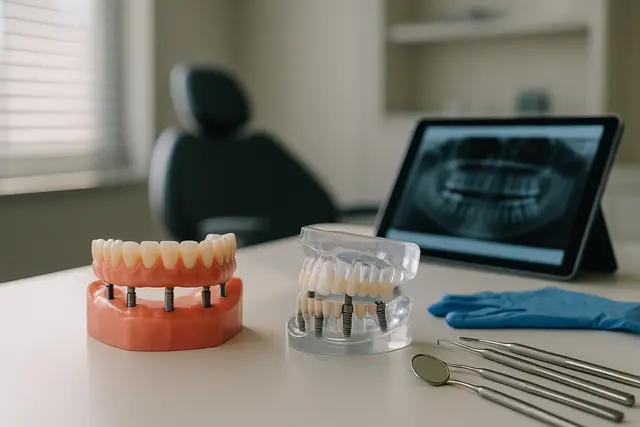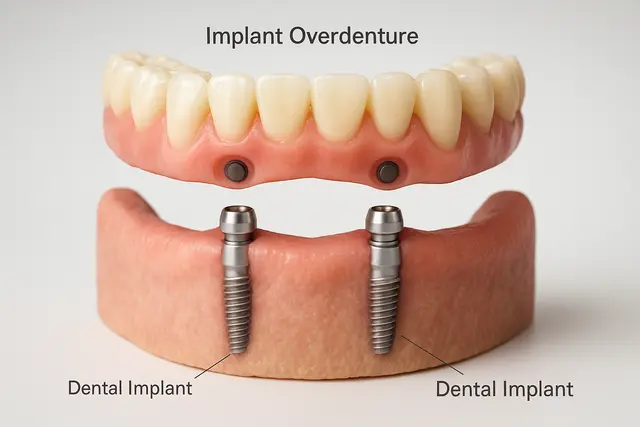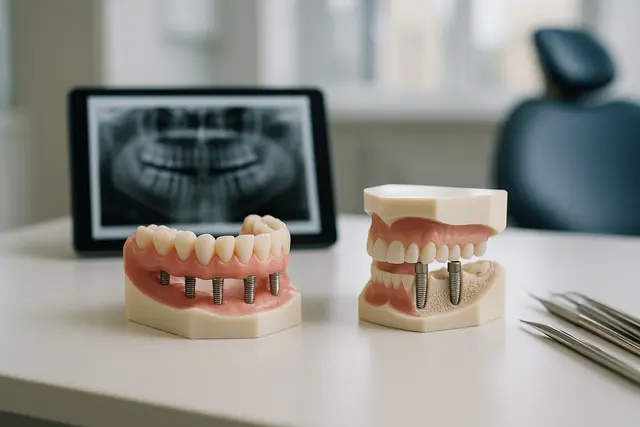Prosthodontics
5 min read
Oct 21, 2025
Chewing With Dentures vs. Implants: Differences
Chewing should be second nature, but for many dealing with tooth loss, it becomes a daily struggle. Whether you're navigating the challenges of traditional dentures or considering the switch to dental implants, understanding how each option affects your ability to chew is essential for making the right choice.

We don’t often think about chewing until it becomes a challenge. Whether you're dealing with missing teeth, tired of adhesive mishaps, or just trying to eat a crunchy apple without fear, understanding how dentures vs implants affect chewing is a game-changer. So if you're choosing between dentures or implants, buckle up. This isn’t just a bite-sized guide. It's your roadmap to restoring your smile and reclaiming the joy of food.
Denture Basics and What They Offer
Dentures offer a time-tested solution for tooth replacement. Whether you're using partial dentures to fill a few gaps or a full set, traditional options have been helping denture wearers for centuries. Seriously, traditional dentures have long been the go-to. But that doesn’t mean they’re flawless.
These prosthetic devices cover the palate and rest on the gum, often needing denture adhesive to stay in place. Because traditional dentures are removable, they need daily cleaning and occasional realignments. Many denture wearers report discomfort, especially with sticky foods or harder foods. And since dentures cover the palate, some say it messes with the ability to taste, which is a real bummer if you're a foodie.
Implant Technology and Chewing Ability
Now enter implants. These little marvels have changed everything. A dental implant is a titanium post that's surgically placed into your jawbone, acting like a new tooth root. It holds the restoration firmly in place, which dramatically improves chewing ability and chewing function.
Implants provide a much more natural feel than dentures, especially when you're eating certain foods that require serious bite strength. They don't slip or slide, and they’re built to last. Whether you're getting a single dental implant or going big with full mouth dental implants, the goal is the same: bring back your natural teeth experience.
Traditional Dentures vs. Modern Options
Let’s talk about traditional dentures vs their newer rivals. Conventional dentures sit on the gum and rely on suction or adhesive. They often shift while chewing, which can cause sore spots, reduced chewing force, and let’s be honest, a ton of frustration.
On the flip side, implant retained dentures (yep, they're a thing) are held in place by, you guessed it, implants. This means fewer worries about embarrassing slips at dinner and way more chewing efficiency. Implant-supported dentures give you the power to eat a wider variety of foods, including those crunchy, chewy, or juicy ones you’ve been avoiding.
Dentures and Dental Implants Compared
If you're sizing up dentures and dental implants, think about what matters most: comfort, confidence, or your relationship with corn on the cob. Kidding... sort of.
Dentures and dental implants both serve the same purpose, but they’re built entirely differently. Dentures may shift and require frequent replacements. Dental implants provide stability and help prevent bone loss, which is huge. When teeth are missing, your jawbone starts to shrink, a process known as bone loss. Implants help maintain bone density by stimulating the jawbone, similar to real teeth.
The Difference Between Dentures and Implants When Chewing
Here’s the real bite: the difference between dentures and implants when chewing is night and day. Implants feel like natural teeth, letting you chew with confidence. Dentures, depending on the fit, can make it hard to break down food properly. This affects digestion and overall nutrition.
Since dentures are removable, they can slip at the worst times (think crunchy tacos or thick sandwiches), and even the best denture adhesive isn’t foolproof. With implant-supported or implant retained options, you get a locked-in feel that boosts your chewing force and gives you a more enjoyable eating experience.
Eat With Dentures or Eat With Implants?
It’s a classic dilemma: should you eat with dentures or invest in eating with dental implants? Many denture wearers get by with soft foods, but often miss the joys of a real steak or a handful of almonds. Dentures vs dental implants in this context is all about confidence and capability.
Implant dentures and implant supported restorations stay securely in place, letting you chew thoroughly and safely. Want to eat a wider variety of foods without second-guessing? Implants are your best bet.
Types of Dentures and Implant Options
There are several types of dentures, including removable and fixed styles. The most common are:
Traditional dentures (removable, sit on the gum, need adhesive)
Partial dentures (used when only some teeth are missing)
Implant-retained dentures (click onto implants for better hold)
If you're looking for stability and performance, implant retained dentures offer that happy middle ground. They combine the convenience of dentures with the strength of dental implants.
Dentures and Implant-Retained Choices
People exploring dentures and implant-retained options often ask about comfort. While traditional dentures can feel bulky or awkward, implant-retained ones are sleeker and stay put. They're ideal for those who want a balance between affordability and function, especially when dealing with tooth loss.
Dentures and implant-supported models can drastically improve oral function, letting you chew more confidently and speak clearly, without the fear of that dreaded mid-meal shift.
Implant Surgery and Placement Process
Let’s demystify implant surgery. It sounds intense, but it’s usually a straightforward outpatient procedure. Your implant dentist will place the titanium post into the jawbone during implant placement, and after healing, attach a crown, bridge, or denture to it.
Sounds like a lot? It's worth it for many people who want long-term results and better chewing. Most folks say the implant process is less painful than expected, and the recovery is manageable with a little TLC and soft foods for a bit.
Dental Specialists and Choosing What's Right
Making the call between dentures or implants isn’t always simple. That’s why talking to trusted dental specialists matters. They'll look at your overall dental health, gum condition, and bone density to guide your decision.
Some patients aren’t good candidates for implants right away due to bone loss or other health concerns. But don’t worry, there are ways to rebuild the jawbone, like bone grafts, or choose an alternative to traditional implants that require less bone support.
Restoring Your Smile with the Right Dental Services
At the end of the day, restoring your smile is about more than looks. It’s about feeling good when you eat, speak, or laugh. Choosing the right dental services, whether for dentures and implants or just a consult, puts you on the path to better health and happiness.
Your mouth does a lot for you, return the favor with a tooth replacement option that gives you the freedom to enjoy food, express yourself, and smile without hesitation.
How Do Dentures and Dental Implants Differ When It Comes to Chewing?
Dentures rest on the gums and can shift during chewing, especially when eating hard or sticky foods. This can reduce bite force and chewing efficiency. In contrast, dental implants are anchored directly into the jawbone, providing stable, secure support that mimics natural teeth. This allows for stronger chewing power and a more comfortable, confident eating experience.
Can You Eat Normally With Dentures or Are Implants Better?
While you can eat with dentures, many wearers find themselves limited to softer foods due to slippage and discomfort. Dental implants, on the other hand, allow for a more natural chewing experience and restore your ability to enjoy a wider variety of foods, including crunchy or chewy items. Implants eliminate the fear of movement while eating and often improve overall digestion through better food breakdown.
What Are Implant-Retained Dentures and How Do They Help With Chewing?
Implant-retained dentures are a hybrid between traditional dentures and dental implants. They “snap” onto implants placed in the jaw, offering enhanced stability over conventional removable dentures. This design significantly reduces movement, improves bite strength, and allows for more confident and effective chewing, especially with challenging foods like apples, nuts, or steak.
Which Option Is Better for Long-Term Oral Function and Comfort?
Dental implants are generally considered superior for long-term oral function, comfort, and bone health. They preserve jawbone density, reduce the risk of gum irritation, and provide a natural tooth-like experience. While dentures are more affordable upfront, they often require adjustments, adhesives, and have a shorter lifespan. If comfort, chewing ability, and long-term performance are priorities, implants are usually the better choice.
Read Next
Related Posts

Prosthodontics
Implant Supported Dentures Overview
Missing teeth can impact more than just your smile, they can affect your confidence, comfort, and even your diet. Fortunately, modern dentistry offers a solution that’s both secure and natural-looking: implant-supported dentures. This innovative approach blends the stability of implants with the convenience of dentures to create a long-lasting, life-improving upgrade.
5 min read
Oct 29, 2025

Prosthodontics
Implant Overdentures Explained: The Hybrid Solution to Missing Teeth
Missing teeth can impact everything from your ability to eat to your self-confidence. While traditional dentures have long been a go-to solution, they often fall short in comfort and stability. Implant overdentures offer a modern alternative that combines the security of dental implants with the convenience of removable dentures, a true upgrade for those looking to reclaim their smile.
6 min read
Oct 29, 2025

Prosthodontics
Implant Retained Dentures Explained
Considering implant-retained dentures? You're not alone. As modern dentistry evolves, more people are turning to this secure, natural-feeling alternative to traditional dentures. This guide will walk you through what they are, how they work, and why they might be the solution you've been looking for.
4 min read
Oct 28, 2025
Don’t have time to research every dentist around you?
See why 30k+ patients trusted us